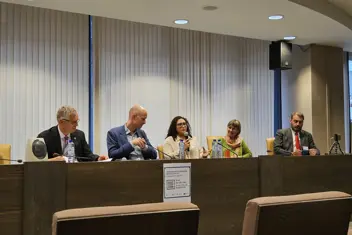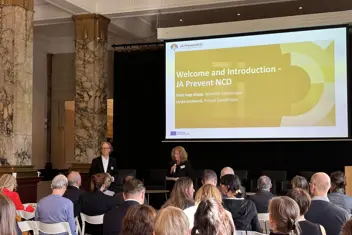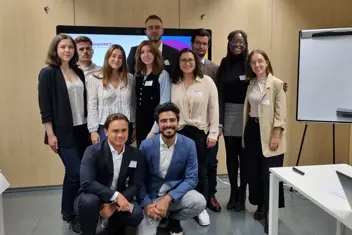A Milestone Week for JA PreventNCD
Last week was pivotal for the Joint Action on Cancer and other Non-Communicable Diseases (JA PreventNCD) project, marking key developments in the ongoing efforts to strengthen prevention systems across Europe.
Three important events took place, each demonstrating the value of collaboration, the growing focus on cancer and other NCD prevention and youth engagement in public health.
Strengthening NCD Monitoring Systems: Joint Event Between WHO, JACARDI, and JA PreventNCD
The week began with a joint event organized by the World Health Organization (WHO), the JACARDI initiative, and JA PreventNCD. Titled "Strengthening NCD Monitoring Systems in the EU: A Collaborative Approach," the event brought together leaders from multiple sectors to discuss strategies to improve the monitoring and management of non-communicable diseases (NCDs) across Europe. Held on 10 September 2024 at Sciensano in Brussels, the event underscored the pressing need for enhanced NCD monitoring and prevention mechanisms as NCD rates continue to rise across the continent.
Key speakers emphasized the importance of building strong partnerships to address the challenges posed by NCDs, which remain the leading cause of mortality in Europe. A central theme of the discussion was how collaborative efforts between these organizations can create a more cohesive and efficient approach to tracking NCD progress, ensuring more accurate data collection, better resource allocation, and ultimately, improved health outcomes for European citizens.
The collaborative nature of the event reinforced the recognition that preventing and controlling NCDs is a shared responsibility. By bringing together organizations with diverse expertise, the event demonstrated how multi-sector partnerships can drive tangible change in public health.

Panel discussion
European Consortium on Cancer Prevention Takes Shape
The next day, attention turned to the inaugural meeting of the European Consortium on Cancer Prevention (EU CCP), an initiative that forms a cornerstone of the JA PreventNCD project. The EU CCP aims to unify efforts in cancer prevention across Europe and is set to play a crucial role in reducing the cancer burden by focusing on preventive measures and evidence-based strategies.
Held on 11 September in Brussels, the EU CCP meeting gathered public health experts, policymakers, researchers, and representatives from European institutions to discuss the consortium's structure, goals, and future direction. One of the key takeaways from the meeting was the unanimous agreement that a centralized body dedicated to cancer prevention is essential to streamlining efforts and enhancing collaboration across EU member states.
Knut-Inge Klepp, Scientific Coordinator of JA PreventNCD, underscored the importance of the EU CCP in the broader context of cancer prevention, stating, "The establishment of the European Consortium on Cancer Prevention is a vital step toward creating a more integrated and comprehensive approach to preventing cancer in Europe. By working together, we can ensure that prevention efforts are both sustainable and impactful."
Linda Granlund, Project Coordinator of JA PreventNCD, echoed these sentiments, emphasizing the consortium's long-term vision. "The EU CCP represents an important commitment to the future of cancer prevention in Europe. While the exact form it will take is still under discussion, we are all in agreement that such a body is needed. It will allow us to build a more coordinated and proactive approach, ensuring that evidence-based strategies are at the forefront of our fight against cancer."
Defining the Future of the EU CCP
As discussions around the EU CCP progressed, participants deliberated on the consortium’s key functions. The focus centered on three primary objectives: supporting member states in implementing cancer prevention programs, promoting research and data-sharing across Europe, and ensuring that policy decisions are grounded in the latest scientific evidence.
The EU CCP is expected to act as a resource hub, offering guidance and support to national cancer prevention programs while fostering collaboration between researchers, policymakers, and healthcare professionals. As cancer prevention strategies evolve, the consortium will play a pivotal role in ensuring that best practices are adopted and scaled across all EU member states.

Knut-Inge Klepp and Linda Granlund presenting
First Meeting of the Youth Advisory Group (YAG)
Another significant event of the week was the first meeting of the Youth Advisory Group (YAG), held in Brussels on September 10. Hosted by Sciensano in partnership with the National Institute of Public Health Slovenia, the meeting brought together young advocates to discuss the critical role of youth in the fight against NCDs and the specific responsibilities they hold within the scope of the Joint Action (JA).
The meeting aimed to address systemic barriers to youth engagement and explore strategies for strengthening youth advocacy within public health. Participants emphasized the importance of empowering young people to take an active role in shaping health policies and ensuring their voices are integral to both current and future NCD prevention efforts across Europe.
By establishing the Youth Advisory Group, JA PreventNCD has made a clear commitment to involving younger generations in its mission. This group will serve as a vital platform for long-term collaboration, enabling youth to contribute to key decisions and policies that shape NCD prevention strategies in Europe.

Youth Advisory Group
Looking Ahead
The outcomes of the week's events represent a significant step forward for the JA PreventNCD project. The joint event with WHO and JACARDI highlighted the growing need for collaboration in NCD monitoring, while the EU CCP meeting reaffirmed the consortium's commitment to proactive cancer prevention strategies. Additionally, the inaugural meeting on the YAG underscored the vital role of youth engagement shaping public health policies, marking a significant moment in empowering young advocates to actively contribute to NCD prevention across Europe.
The establishment of the EU CCP is a crucial development as we look towards the future of cancer prevention in Europe. With further discussions planned, the consortium will continue to refine its structure, ensuring that it makes a lasting impact on reducing cancer incidence and mortality rates across Europe.
As Knut-Inge Klepp noted in his closing remarks, "This is just the beginning. Together, we are building a future where cancer prevention is not just an aspiration, but a reality for all Europeans."
